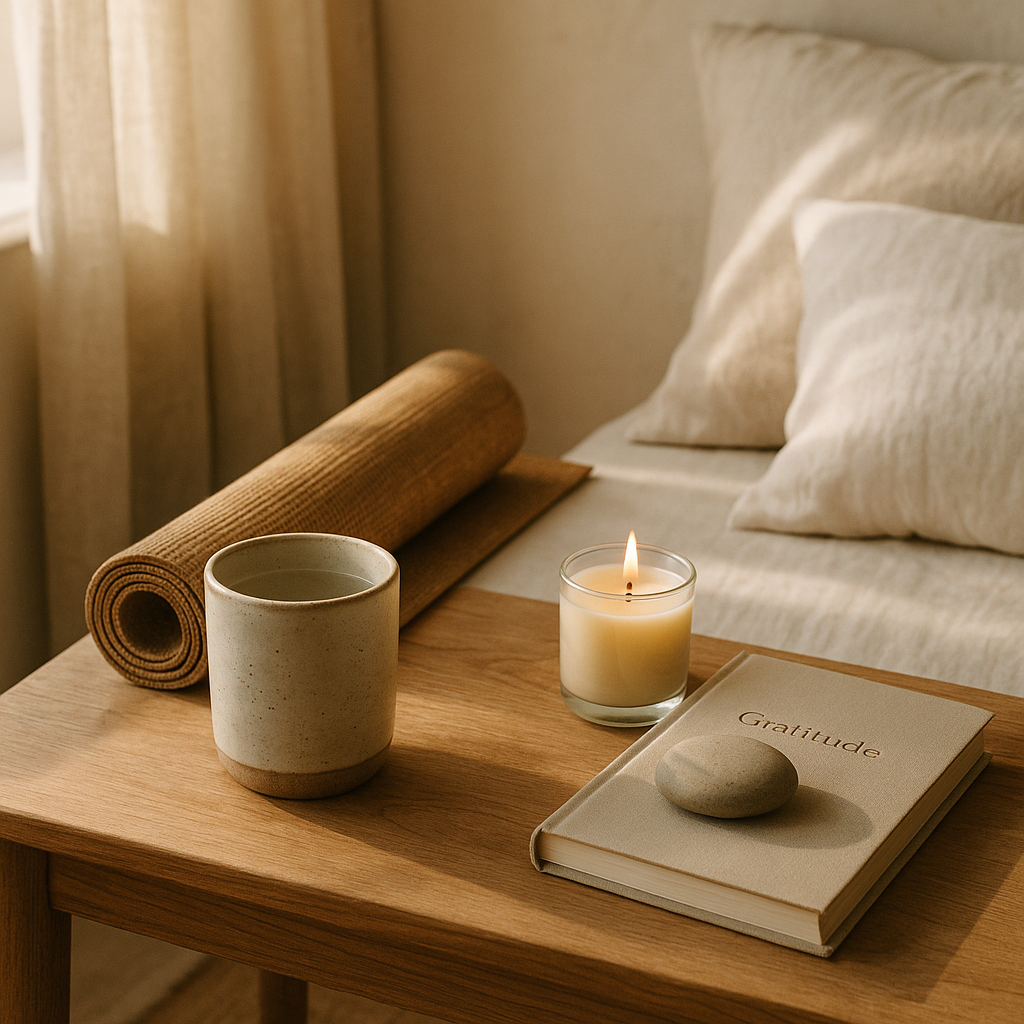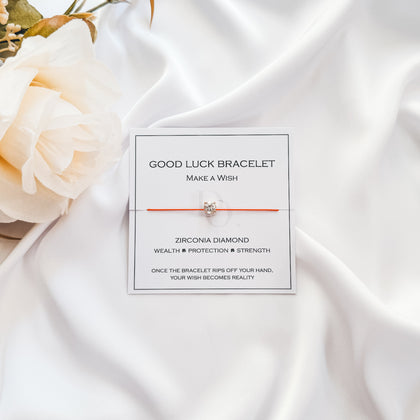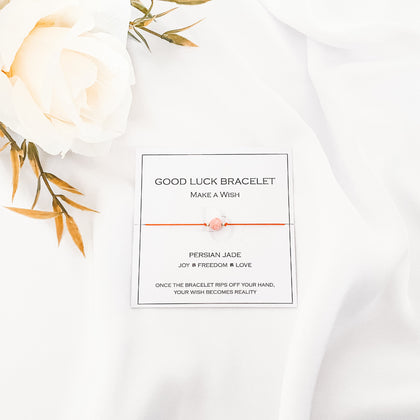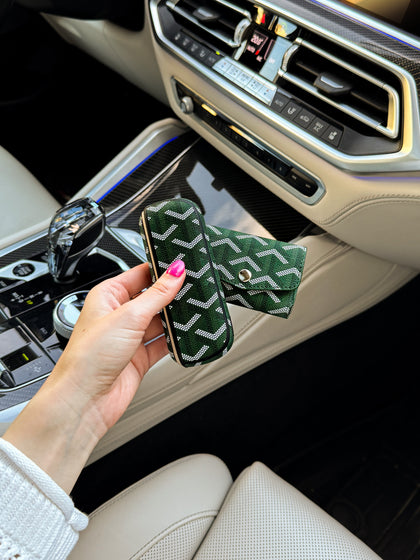The Lucky Edit by Do.Dreamss
Adding Meaningful Self Care Rituals to Your Routine
In a world that constantly demands our attention, energy, and time, the concept of "self-care" has risen to prominence—yet it's often misunderstood. Scrolling through social media, you might think self-care is limited to expensive spa treatments, elaborate bubble baths, or buying the latest wellness product. But meaningful self-care goes much deeper. It's about creating intentional rituals that genuinely nurture your body, mind, and spirit rather than momentary indulgences that provide only fleeting relief.
What makes a ritual different from a random act of self-care? Rituals are practiced with intention, consistency, and purpose. They become anchored in our daily lives, providing structure and sustenance when we need it most. Self-care is a foundational aspect of designing a life well-lived and goes far beyond bubble baths or face masks. In this guide, you'll discover how to create meaningful self-care rituals that support genuine wellbeing, overcome common obstacles to consistent practice, and measure the profound benefits these rituals bring to your life.
What makes self care rituals "meaningful"?
Meaningful self-care addresses your fundamental human needs rather than temporarily masking symptoms of burnout or stress. When we scroll through #selfcare on social media, we often encounter products to buy or luxuries to splurge on—but these rarely address what our minds and bodies truly require for sustained wellbeing.
According to positive psychology research, meaningful rituals connect directly to our basic psychological needs: autonomy (having choice in our actions), competence (feeling effective), and relatedness (connecting with ourselves and others). When self-care practices satisfy these needs, they become more than just pleasant activities—they become powerful sources of resilience and contentment.
Holistic wellness practitioners often reference Maslow's Hierarchy of Needs when explaining why some self-care practices feel more nourishing than others. Activities that support your physiological needs (quality sleep, nutrition, hydration), safety needs (creating boundaries, managing stress), and belonging needs (nurturing relationships) build a foundation that makes all other forms of self-care more effective.
The science of habits in self care
James Clear, author of "Atomic Habits," emphasizes that tiny, consistent actions create remarkable results over time. This principle applies powerfully to self-care. Rather than pursuing elaborate weekend retreats or expensive treatments, the most transformative approach involves small, daily rituals that gradually reshape your relationship with yourself.
Neuroscience supports this approach—when we repeat a self-care behavior in a consistent context, our brains form neural pathways that make the behavior increasingly automatic. After about 66 days (the average time to form a habit, according to research from University College London), what once required willpower becomes a natural part of your day.
Self-awareness plays a crucial role in developing meaningful rituals for your routine. By tuning in to your actual needs—not what influencers or wellness marketers suggest you need—you can identify practices that provide genuine nourishment. This might look different for each person; an extrovert might find social connection deeply restorative, while an introvert might need solitary reflection to feel renewed.
Building your own daily self care rituals
Creating a personalized self-care practice begins with understanding your unique needs across different dimensions of wellbeing. Rather than adopting someone else's routine wholesale, consider designing rituals that address your specific circumstances, personality, and preferences.
A holistic approach to daily self-care addresses three essential aspects of your being: physical body, mental landscape, and spiritual or emotional foundation. By intentionally tending to each dimension, you create a well-rounded practice that supports overall resilience and joy.
Self care for the body: movement, nourishment, rest
-
Morning movement ritual: Before checking your phone, spend 5-10 minutes stretching or doing gentle yoga to awaken your body. Focus on how the movement feels rather than how it looks.

- Mindful eating practice: Choose one meal daily to eat without screens, paying full attention to flavors, textures, and the experience of nourishment.
- Sleep sanctuary ritual: Create a 20-minute wind-down routine that signals to your body it's time for rest—perhaps gentle stretching, lowering lights, or writing tomorrow's to-do list to clear your mind.
- Hydration ceremony: Keep a special vessel for water, and each time you fill it, take three deep breaths before your first sip, turning a basic need into a moment of presence.
- Posture reset: Set a gentle alarm for three times daily to check in with your body position, release tension, and realign your spine—especially helpful for desk workers.
Mindful rituals for clarity and joy
- "Three good things" practice: Each evening, write down three positive moments from your day, no matter how small. This trains your brain to notice the good.
- Media consumption boundary: Designate specific times for news and social media rather than constant checking, creating space for your own thoughts.
- Curiosity pause: Choose one ordinary object or experience daily and examine it with fresh eyes, noticing details you'd typically overlook.
- Single-tasking session: For 15-30 minutes daily, focus entirely on one activity without multitasking—whether reading, cooking, or conversing—experiencing the richness of full attention.
- Worry container: Keep a dedicated notebook for anxieties and concerns, writing them down to physically and mentally contain them until you're ready to address them.
Nurturing spiritual & emotional wellness
- Gratitude touchstone: Place a small object (stone, crystal, charm) in your pocket. Each time you touch it throughout the day, pause to name something you're thankful for.
- Connection ritual: Schedule a weekly check-in with someone who nourishes your spirit, whether via call, text, or in-person meeting.
- Values alignment check: Once weekly, reflect on whether your actions and choices have aligned with your core values, celebrating congruence and noting areas for growth.
-
Nature immersion: Spend time outdoors daily, even briefly, paying attention to natural elements that awaken wonder or peace.

- "Permission slip" practice: Write yourself a literal permission slip each morning for something you need—rest, imperfection, asking for help—and carry it with you.
For more inspiration on unique self-care activities or to explore what's trending in holistic living, explore what's new at Do.Dreamss.
Remember that consistency matters more than perfection. Starting with just one or two rituals and practicing them regularly will create more benefit than attempting an elaborate routine you can't sustain. The most effective daily self-care checklist is one you'll actually use—simple enough to maintain yet meaningful enough to matter.
Overcoming common self care challenges
Despite our best intentions, establishing consistent self-care rituals often meets resistance—both internal and external. Understanding these barriers is the first step toward dismantling them.
The most pervasive obstacle is guilt. Many people, especially caregivers or high-achievers, feel selfish prioritizing their own wellbeing. This mindset fails to recognize that self-care isn't self-indulgence—it's self-preservation. Like the airline safety instruction to secure your own oxygen mask before helping others, maintaining your wellbeing enables you to show up fully for everything and everyone else in your life.
"I don't have time" ranks as another common barrier. However, this perception often stems from viewing self-care as something extra to add to an already crowded schedule, rather than an integrated part of daily living. Start by identifying small pockets of time—five minutes between meetings, your morning shower, the commute home—where you can incorporate mindful moments or brief rituals.
Perfectionism derails many wellness practices before they begin. The belief that self-care must look Instagram-worthy or follow some ideal standard prevents many from starting at all. Instead, embrace the concept of "good enough" self-care—imperfect practices that nevertheless nourish you where you are right now, with what's available to you.
Environmental and financial constraints present real challenges. Not everyone has access to quiet space, discretionary income, or supportive communities for certain wellness practices. This calls for creativity and adaptation—finding free alternatives, reimagining spaces, or creating boundaries within limitations. Remember that some of the most profound self-care rituals cost nothing: intentional breathing, mindful observation, or expressive movement.
Social pressure and media messaging can distort our understanding of what constitutes "proper" self-care. Commercialization has transformed a fundamentally personal practice into something that often requires purchasing specific products or experiences. Reclaim your autonomy by asking, "What do I actually need right now?" rather than "What should self-care look like?"
If you're looking for even more practical ways to overcome self-care obstacles, be sure to explore what's new at Do.Dreamss for additional insights and guidance.
Building sustainable habits requires both structure and flexibility. Try these approaches:
- Habit stacking: Attach new self-care rituals to existing habits (meditation after brushing teeth, gratitude practice while making coffee).
- Environmental cues: Create visual reminders in your space—a yoga mat visible by your bed, a gratitude journal on your nightstand.
- Accountability partnerships: Share your intentions with someone who will check in compassionately.
- Flexible consistency: Aim for regularity rather than rigidity, having backup options when your primary ritual isn't possible.
- Self-compassion practice: When you miss days or struggle with consistency, respond with kindness rather than criticism.
Benefits of meaningful self care (and measuring your progress)
Consistent self-care rituals yield profound benefits that extend far beyond momentary pleasure. Understanding these outcomes can motivate continued practice and help you recognize progress even when it feels subtle.
Stress reduction ranks among the most immediate and measurable benefits. Intentional self-care activates your parasympathetic nervous system—your body's "rest and digest" mode—countering the fight-or-flight response that chronic stress triggers. This physiological shift reduces cortisol levels, lowers blood pressure, and improves immune function over time.
Enhanced mental health emerges as another significant outcome. Regular self-care practices have been associated with decreased symptoms of anxiety and depression, improved emotional regulation, and greater psychological resilience. By creating space to process emotions and experiences, meaningful rituals help prevent the accumulation of unaddressed psychological strain.
Improved physical wellbeing naturally follows consistent self-care. Whether through better sleep quality, more intuitive eating patterns, consistent movement, or simply the reduced physical toll of chronic stress, your body responds positively to intentional care. Many people report fewer stress-related ailments, more energy, and better management of existing health conditions.
Increased self-awareness and self-compassion develop through regular practice. As you tune in to your needs and honor them through rituals, you naturally become more attuned to subtle signals from your body and mind. This heightened awareness often extends to greater compassion toward yourself—recognizing your humanity and treating yourself with the same kindness you'd offer a good friend.
Enhanced creativity and productivity might seem counterintuitive benefits of taking time for self-care, but many find that regular restoration prevents burnout and enhances focus. By creating space between stimuli and response, self-care rituals foster mental clarity that supports innovative thinking and sustained attention.
For readers ready to invest further in personal wellness, check out our curated explore what's new at Do.Dreamss.
Tracking your progress helps sustain motivation and recognize growth. Consider these simple measurement methods:
- Wellbeing journal: Keep brief notes about your energy levels, mood, stress, and overall sense of balance, noting patterns over time.
- Ritual tracker: Use a simple calendar or app to mark days you complete your chosen rituals, celebrating consistency rather than perfection.
- Body awareness check-ins: Regularly scan your body for tension, energy, or discomfort, noting changes as your practice deepens.
- Relationship inventory: Periodically reflect on how your interactions with others have shifted—many find improved boundaries, communication, and presence.
- "Then and now" reflections: Every few months, write about how your relationship with yourself has evolved since beginning intentional self-care.
Conclusion
Creating meaningful self-care rituals transforms the concept from an occasional indulgence into a powerful foundation for living. When we move beyond trendy definitions and commercial interpretations, we discover that true self-care is about honoring our humanity—responding to our needs with intention, compassion, and consistency.
Start where you are, with what you have. Choose one or two rituals that resonate most deeply, integrating them into your existing routine. As these practices become second nature, gradually expand your repertoire, always listening to what your mind, body, and spirit genuinely need rather than what external voices suggest you should want.
Remember that self-care is not selfish—it's necessary. In a culture that often values productivity above wellbeing, choosing intentional self-nourishment becomes a radical act of self-respect. Your rituals may look different from others', and they will likely evolve as your life circumstances change. This flexibility is not a failure but a testament to your growing self-awareness.
The journey toward meaningful self-care is ongoing, with no final destination. Each day offers new opportunities to check in with yourself, honor your needs, and build resilience through small, consistent acts of care. Over time, these practices don't just sustain you—they transform how you move through the world, how you relate to others, and most importantly, how you relate to yourself.
What self-care rituals have made the biggest difference in your life? Share your experiences in the comments below, or browse the latest wellness tips and news for fresh inspiration on your journey toward holistic wellbeing.
Frequently asked questions
What makes a self-care ritual "meaningful"?
A meaningful self-care ritual addresses your real needs (not just trends or purchases), supports long-term wellbeing, and feels emotionally nourishing rather than obligatory.
How do I start a daily self-care routine?
Begin with one or two simple activities (like a morning gratitude note or a mindful walk), integrate them at the same time each day, and increase gradually based on your needs.
Can self-care rituals help with stress?
Yes—intentional habits (deep breathing, movement, journaling, or personalized "weird" rituals) can significantly reduce stress and build emotional resilience.
Does self-care require expensive products?
Meaningful self-care is about listening to your needs and meeting them in sustainable ways—not about spending money. Many rituals are free and surprisingly simple.
How do I stick with self-care rituals long-term?
Foster consistency by choosing enjoyable practices, building boundaries, and tracking your progress with a self-care checklist or journal. Adjust as your life changes.








